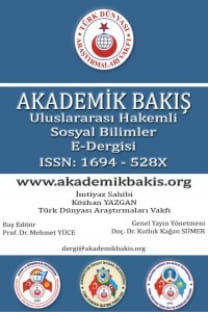AN ANALYSIS ON THE RELATIONSHIP BETWEEN RELIGION AND THE BLACK AWAKENING: AMERICAN SOUTH AND SOUTH AFRICA
Öz
Belief and religion are interconnected
terms for the purposes of defining discrimination and segregation inside
societies. Particularly, during the white dominated regime years in the
American South and South Africa, two main religions; Christianity and Islam were
essence of key weapons in order to assemble and to collaborate for black people
against black segregation. Moreover, religion played a vital role in the Black
Power movement which paved the way for researchers and historians to conclusively
ascertain answers to why religion should be considered as one of the vital
dynamics of political resistance.
This research will attempt to investigate
the impact of the religions to the process of the black resistances as the mass
movements both ‘the Black Consciousness Movement’ in South Africa and ‘Civil
Rights Movement’ in the American South basically between the years 1960 and
1975. Besides, in order to achieve the arguments with comparisons and similarities,
Islam in the American South and Christianity in South Africa will be examined
specifically.
Additionally,
the image that specific religious leaders’ ideals and thoughts shaped on the
followers will be annexed to the research. Steve Biko and Malcolm X’s analysis
will be the key terms in order to reflect the religion in the black awakening
as a mass movement.
Basically, there will be an attempt to evaluate
the historical period of racism and its implication for the black segregation.
After defining the black resistance movements linked by the religious thoughts
and also by the leaders, eventually, the similarities, compassions and the links
between them will be reached as a conclusion.
Anahtar Kelimeler:
Black Power Movement, Steve Biko, religion, Malcolm X, civil rights
___
Adam H., Giliomee H. (1979). Ethnic Power Mobilized, Can South Africa Change? United States of America: Yale University Press. Cell, J.W. (1982). The Highest Stage of White Supremacy. Cambridge: Cambridge University Press. Cone, J.H. (1999). Risks of Faith: The Emergence of a Black Theology of Liberation, 1968-1998. Boston: Beacon. Conyers, J. L. Jr. (2006). Engines of the Black Power Movement, Essays on the Influence of Civil Rights Actions, Arts and Islam. North Carolina: McFarland & Company, Inc, Curtis, E., E. (2002). Islam in Black America: Identity, Liberation and Difference in African-American Islamic Thought. Albany: State University of New York. Dubow, S. (1995). Scientific Racism in South Africa. Cambridge: Cambridge University Press. Fatton, R. (1986). Black Consciousness in South Africa the Dialectics of Ideological Resistance to White Supremacy. United States of America: State University of New York. Fredrickson, G. M. (2002). Racism a Short History. Oxford: University of Princeton. Harris, F. C. (1994). Something Within: Religion as a Mobilizer of African-American Political Activism, The Journal of Politics, 56 (1), 42-68. Harris, F. C. (1999). Something Within: Religion in African-American Political Activism, Oxford: Oxford University. Lilcoln, C., E., (1994). The Black Muslims in America. Michigan: Africa World. Unsworth, T. (1997). Racism and Religion: Partners in Crime?, Salt of the Earth http://salt.claretianpubs.org/issues/racism/unsworth.html, 29.04.2018. Roberts J. D. (2005). Bonhoeffer and King: Speaking Truth to Power. United States of America: Library of Congress in publication Data Savage, B., D. (2008). The Politics of Black Religion, Your Spirits Walk Beside Us. United States of America: The Belknap Press of Harvard University. Stubbs, Cr. A. (1988). Steve Biko I Write What I Like. Great Britain: Penguin Books. Turner, R. B. (1997). Islam in the African-American Experience. Indiana: Indiana University. Walshe, P. (1983). Church versus State in South Africa: the Case of Christian Institute. United Kingdom: C. Hurst & Co. Williams, J. (2002). Linking Beliefs to Collective Action: Politicized Religious Beliefs and the Civil Rights Movement. Sociological Forum, 17 (2), 203-222.- Başlangıç: 2004
- Yayıncı: Akademik Bakış
Sayıdaki Diğer Makaleler
BEKİR YILDIZ'IN GÖZÜNDEN TÜRKLER ALMANYA’DA
BEKİR YILDIZ'IN GÖZÜNDEN TÜRKLER ALMANYA’DA
DİE DARSTELLUNG DER TÜRKİSCHSTÄMMİGEN MİGRANTINNEN İN DER ÖSTERREİCHİSCHEN PRİNTMEDİEN
AĞAÇ YAZMA KALIPLARINDA ÖZGÜN DESEN GELİŞTİRME SÜRECİNE İLİŞKİN ÖRNEK UYGULAMA
DEĞİŞEN ULUSLARARASI SİSTEMDE ABD’NİN ORTADOĞU POLİTİKALARININ SÜRDÜRÜLEBİLİRLİĞİ
AHLAKİ TEMELLERE DAYANAN İSLAM EKONOMİSİ SİSTEMİNDE DEVLETİN ROLÜ
